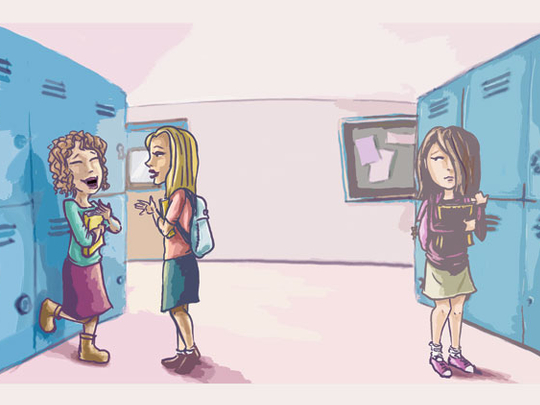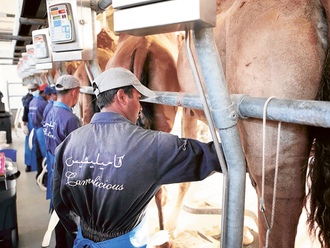
15:05 Gulf News: Parents and caregivers sometimes diagnose normal shyness as social phobia or anxiety disorder due to modern-day reactionary behaviour.
15:07 Uzma Khan: For the past five years I am working in the education sector in Abu Dhabi. I have worked as the head of student affairs in a college where the age group of students was from 16 to 19. I have come across many teenagers who needed a little push to become more social.
15:09 Shereen Mir: In my opinion, it is actually the reverse that happens. Children often tend to be afraid of people. But this fear is taken as shyness.
15:09 Drishya Dinesh: I feel that in schools that have student councils the social phobia among pupils may be reduced quite a bit. When teenagers are faced with a situation that may make them feel shy, how they deal with that situation can shape their future reactions to similar situations. For example, if teenagers who are shy approach new activities one at a time, it can help them become more confident and comfortable. But if they feel pushed into situations they don't feel prepared for, or if they are teased or bullied, it can make them shyer.
15:12 Pooja Vishwanathan: True. Today, the bold and outspoken are understood and valued much more than those who are shy and introverts. Their achievements and their problems are taken for granted. Most of the people have learnt to speak their minds today. The minority face the difficulty and are seldom understood.
15:12 Shalini Menezes: I have a teenage daughter and can very well relate to this issue. Often sulking away or avoiding doing something. too, is a way of expressing shyness.
15:13 Lodhi Azmat Allah: It has always seemed to me that in schools when children are very shy and need the help of a teacher to tackle a problem, they are unable to speak about it, which causes further problems for them.
15:16 Uzma Khan: I feel teachers can play a very good role by giving a compliment or acknowledging a shy student's work. But a teacher has to complete a book's chapter or a topic in class as they have to follow the academic calendar. So, they tend to avoid shy students as it will consume their time from a class.
15:16 Pavan Kumar: Nowadays elders ask us never to talk with strangers and teenagers actually follow it. That might give people an idea that the teenager is shy.
15:17 Shereen Mir: Such shy children should be spoken to, so that they get the confidence that they can share things openly with their elders or parents. Simply terming it as ‘shyness' and sitting back will not do any good.
15:21 Shalini Menezes: Every problem surely does have a solution it is with this mind frame things will work in the positive direction. Some children are just naturally shy. There is not necessarily anything wrong in that, unless it is hampering them from making friends, participating in classroom discussions or keeping them on the sidelines, with them just peeking over at the activities they would really enjoy. There is a difference between being shy and being reserved. Being reserved simply means that there is ample lead-in time before the teenager decides to voice their opinion, but they will eventually be vocal about their opinion even if it differs with everyone else's. Being shy is more likely to mean that they will never vocalise their opinion for fear of being thought poorly of, made fun of, or the object of ridicule. Shy children will allow themselves to be walked all over while reserved children are simply measuring up a situation to figure out how to best deal with it.
15:21 Gulf News: Shyness isn't very well tolerated in a world where projection is important.
15:21 Meghna Tony: To climb the corporate ladder, you need to be smart and competent. There is no doubt that shy people will be left behind. Even in schools, the timid ones are often not recognised while the active and energetic pupils are acknowledged.
15:22 Pavan Kumar: Teenagers who actually have talent but are shy might probably feel that he or she does not have talent. So, of course, sometimes projection is important.
15:23 Uzma Khan: All a shy child needs from teacher is little attention, a compliment and acknowledgment of an effort.
15:23 Dorothy Naveena: Fear in a child's mind should be removed. Helping them cope with their fears is essential. This is not just in a teacher's hand; it needs the involvement of parents as well. Children should be encouraged to speak, express their anxieties. Never put them down. The method used to correct a child is the basic factor that makes a child shy. Encouragement, helping them mingle with others makes them outspoken. Encouraging their talent and making them speak about it is the only way to overcome shyness.
15:24 Pooja Vishwanathan: I agree. To survive today, we are needed to market ourselves, publicise our talents and achievements. The bold, confident and the extrovert has the upper hand, obviously. The shy, introvert, working on the back stage person is given very little importance or no value at all.
15:25 Shalini Menezes: I was an introvert but as time passed, I realised that I have to step out of my cocoon and explore the world. It needed a lot of courage and self-motivation. I learnt that shyness is one aspect that needs to be left behind and we need to move on. I did exactly that - pushed myself and today I am really happy with my decision. I guess self-motivation is a catalyst in shaping our lives.
15:25 Gulf News: Social media can push shy children towards further isolation.
15:25 Uzma Khan: Yes, I have many students on my Facebook account and they have totally different personalities altogether on how they project on these social media websites. But we can use these things in learning about these children and how we can help them overcome their real-life shyness.
15:26 Meghna Tony: Social networking sites like Facebook and Twitter boost the interactive ability of children. They are able to socialise and express themselves. But such sites do have their own disadvantages like getting addicted, use of inappropriate language or wrong relationships, which can push children towards isolation.
15:26 Shereen Mir: I would rather say that it has helped many children gain self-confidence on a slightly broader front.
15:27 Pavan Kumar: Teenagers who are shy actually dont create accounts on websites because they feel it is unsafe.
15:27 Shalini Menezes: Social media has its pros and cons. As children have all the mediums of exploring these sites with gadgets of their own, parental supervision and intervention becomes almost negligible.
15:28 Lodhi Azmatullah: Yes, I agree that social networking is playing an important role in developing personal skills, they know each other and face each other without any hesitation.
15:29 Dorothy Naveena: Social media is a boon to today's teenagers, but, it needs to be monitored. Overindulgence could be destructive. Teenagers today are more influenced by their peers or celebrities their age. The best to quote is social networking - students who don't speak write a lot on their walls. They use quotes to speak their mind.
15:30 Pooja Vishwanathan: Social media to quite a large extent has already pushed a majority of the teenagers and young adults into isolation. Social networking has lessened their need to initiate a conversation and communicate with friends and relatives.
15:31 Gulf News: Focus on academic achievement stops teachers from taking time out to help children who need help.
15:31 Meghna Tony: Nowadays, teachers are pressured to achieve good academic results for the welfare of their school. A sharp student is their main target resulting in negligence of the average or slow learners. The active students are those who make the lessons interesting. Consequently, teachers focus on them and sometimes ignore the passive ones.
15:32 Shalini Menezes: Teachers are under pressure to achieve so much in a few hours' time. They really need superpowers to help them achieve it.
15:25 Uzma Khan: I will not blame teachers but it is how the whole academic process is designed.
15:33 Drishya Dinesh: Shy parents might also unintentionally set an example by avoiding certain social interactions. A shy child who watches this learns that socialising is uncomfortable, distressing, and something to avoid.
15:36 Dorothy Naveena: Being a teacher, I don't agree with the statement. We look at the overall personality development in a child. And being an English teacher, I work on their skills. I do agree that every child has his or her own way to succeed; some speak while some others just listen or write. What is important is the outcome - it can be in any form, but the way we appreciate the outcome matters much more.










